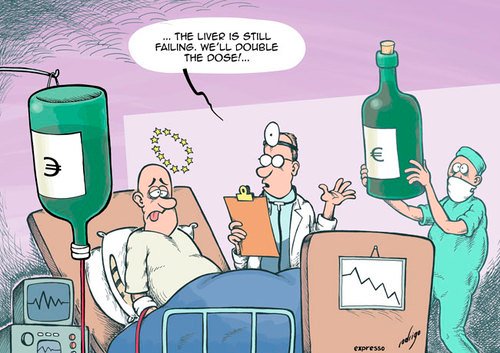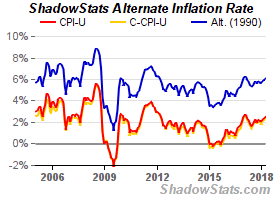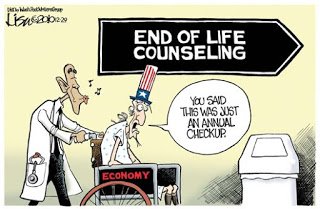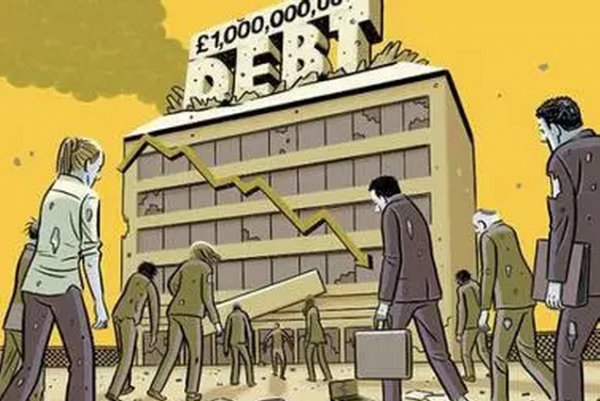Fed tightening may just squeeze the life out of the system!
Another Fed interest rate rise is touted for Wednesday. In an over-leveraged world this could have serious consequences. Since 2008 the economy, like a comatose patient, has been on life support. The current Quantitative Tightening (QT) programme by the US Fed amounts to the slow withdrawal of one of the drugs keeping the patient alive. Nobody knows the affect it will have on the patient.

A major reason they don't know the affect it will have on the patient is because the figures on their charts have been doctored. In plain English, government's have played around with how statistics are calculated to give them the best political outcome. However, over time, slight adjustments become major ones. Until you reach a point where the bias becomes so extreme as to give a false impression of reality. Economist's who simply study the data will inevitably come to the wrong conclusions or be unable to make safe predictions for treatment.
Another major reason is no-one is quite sure about the general health of the patient. On paper, fitness [profitability] looks high. However, a closer look at many successful patients (like Amazon or Netflix), reveals balance sheets that show the companies are actually running a loss. In an era of cheap borrowing businesses have kept going only through borrowing at low interest rates. This collapse in profitability is a hidden feature of our world. It has, ironically, been driven by the global expansion period we have/are living in and the huge investment in computers, etc. So, the patient may be a heart attack waiting to happen.
How can we tell? Well disregarding the official statistics and looking at those provided by John Williams of ShadowStats to get a more accurate picture. He uses the statistical formulations from the 1980s as a constant comparison tool. As you can see in the chart below the difference in inflation is marked. It's as basic as the world's economists using a faulty thermometer.

The US has great health care - some of the world's best hospitals and finest doctors. However, it is expensive. Keeping a patient on permanent life support is costly. The drugs are costly. The bill is being paid by the majority of people. Everywhere is seeing an ongoing squeeze on wages. The emerging markets are likely the most vulnerable to the US Fed QT as they have borrowed lots of dollars which QT makes more expensive. Here in Europe we have austerity, and in the UK they are privatising the National Health Service, no more hospital for my town.

They couldn't let the banks fail in 2008 so they put them on life support to buy some time, it's a rather expensive measure but we were told there is no alternative. After all a collapse of the market will mean mass unemployment, and untold misery and degradation for millions. However, the drug of Quantative Easing (QE) far from helping the patient to recover actually makes them weaker and ever more drug dependent.
Armed with an awareness that the patient may not be in the best of health already, and that they are much weaker than you were led to believe, you may perhaps have some concerns over the current QT treatment plan. The Keynesian treatment plan of simultaneous deficit finances and state expenditure was shown to be a massive failure and widely discredited by the 1970s. Yet here we have a twisted version of Keynesianism, only money is now being printed to prop up the stock , housing and bond markets. A withdrawal of the money drug could seriously impact any or all three of these sectors.
The initial reaction to this rate rise may be positive. The economic doctors will sound confident and all will seem well. The consequences may see a further rise in the strength of the dollar, which will make US exports more expensive at a time when the US are pursuing a fresh round of tariffs. Meanwhile, as Argentina gets an IMF bailout, other emerging markets such as Turkey or India may find their currencies coming under extensive pressure as Dollar debt repayments loom and credit becomes more expensive.
The bill for maintaining the patient, the zombie economy of the last decade, will be enormous. On top of the actual "cure" (which is to take the patient off the life support completely and let things take their course) there are the medical bills, and then the interest payments on the loan we took out to pay for the medical bills!

QT is a step to 'normalising' things. The ill-founded belief that the patient can be slowly weaned off QE. Remember that at the moment it is only the FED who are conducting QT. The UK Bank of England had to stop their QT programme due to officially bad figures, and Mario Draghi over at the ECB has stated repeatedly "whatever it takes", as he buys Italian bonds hand over fist. Although the ECB will be meeting soon on whether or not to start their own QT, so it will be interesting to see what they actually decide. With Germany set to take the reins there may be a change of direction? Has Japan, the poster boy of QE, ever stopped?
It is most likely the Fed are aware, just not publicly, that they need to increase interest rates now if only so they have room to lower them later to deal with a recession. However, so fragile is the patient that the smallest change to medication must be observed closely for counter indications. Ultimately, there is no way to normalise this situation. The cure will be the cold shock of reality that has been delayed since 2008 only exacerbated by the recklessness of embarking on an unsterilised money printing (QE) programme that could well be the death of the patient.
The Doctor Economist's over at the Fed are chancing with the patient. They really don't know what they are doing. They don't even know they are working with faulty instruments. They have a misguided sense of faith in their ability to manipulate an entire global market. I believe the intervention was meant as an immediate crisis measure, one which they did not see as permanent as they are still advocates of the "free market", and they think they can get the patient back on their feet. They think they can manage the system - socialism for the 1%!

These are interesting times we're living in. Look in every direction and you find yourself standing on the brink of something huge.
And yet the majority are absolutely sleep walking into this!!
will they hike a 1/4,..1/2?? guess we'll soon find out. no matter what happens, preparations need to be made. better to have started yesterday but barring that, today is better than tomorrow.
Great insight into the world's economy. The big crash has been predicted; the big question now, is when?
Thanks for using #happystream !
Or was 2008 the big crash - we're just waiting for the Tsunami??
Crash / tsunami... whatever... it will be messy! Personally, I believe 2008 was nothing compared to what will come. Hopefully I'm wrong.